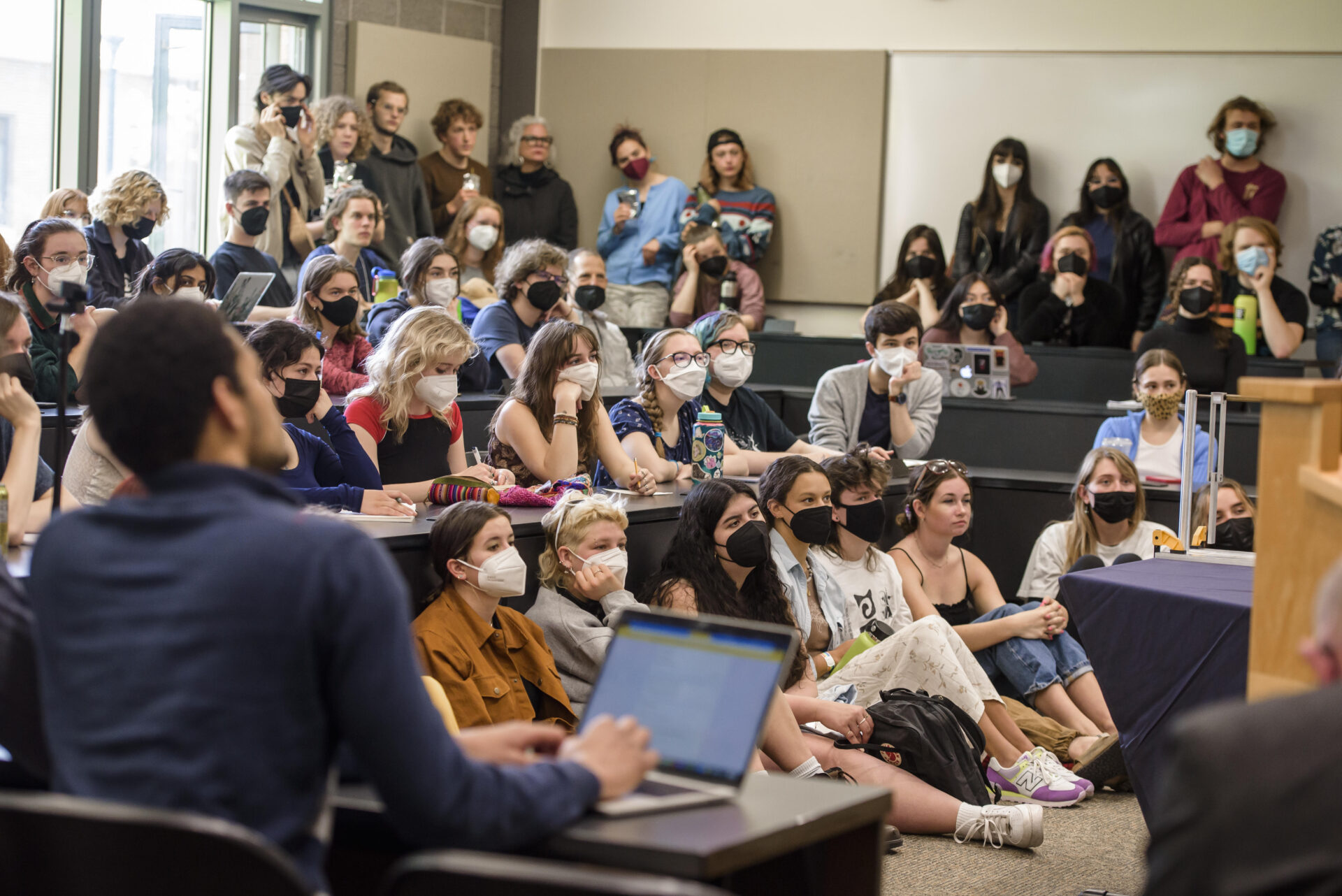
On the morning of April 8, Festival of Scholars and Artists (FOSA) began at Lewis & Clark, marking the annual celebration and exhibition of work by students.
This year, FOSA returned to an in-person format with hybrid options, after having an online format during the COVID-19 pandemic. According to Associate Professor of French and Chair of the organizing committee Isabelle DeMarte, this return was highly successful.
“Attendance was great,” DeMarte said. “Even in the morning sessions at 9 a.m. rooms were filled.”
This year’s festival also saw the introduction of several new aspects and activities. These included the close integration and cooperation of the Student Academic Affairs Board (SAAB), which is celebrating its 40th anniversary. During the festival, SAAB operated an arts and crafts room, a raffle contest for panel attendees, a “FOSA Feud” contest inspired by “Family Feud” in the afternoon and supplied volunteers to moderate Zooms throughout the day, who worked side by side with staff and faculty volunteers.
“SAAB provided the ‘fest’ in the festival by being there and encouraging attendance from a different perspective,” DeMarte said.
The real basis of the festival, however, remained the student-presented panels. This year’s panels sought to draw connections between different areas of student research, ranging from art preservation to theoretical mathematics to zoology, in an effort to demonstrate the diverse, well rounded and liberal arts-centered nature of LC.
“Each panel had different divisions and different disciplines represented,” DeMarte said. “What this does is reflect the variety of endeavors that students undertake at LC.”
A similar experience of interdisciplinary sharing was borne out among students who attended the panels, including Lucien Petit ’25.
“I think it’s very easy to get stuck in your own department and only hear ideas and research from people doing similar things to you,” Petit said. “But something like this, where they put a bunch of disciplines together in the same room is really important for sharing knowledge.”
In between panels and student poster sessions, students were also able to visit a Staff Appreciation Table, a new feature in this year’s celebration devised by the FOSA organizing committee to increase inclusivity and celebrate April as Staff Appreciation Month. Additionally, during lunch students could attend round tables to discuss topics while eating.
Another new element of the festival this year was the partnership between FOSA and Arts @ LC, which sought to improve the festival’s presentation of the creative and performing arts. This was exemplified by the introduction of an “Arts Corner” in the alumni circle, where poetry, live music and other creative works were performed and read. This replaced FOSA’s traditional practice of presenting the arts within Evans Hall. Many of the performances were also snippets from the upcoming Theatre Thesis Festival.
The Art Corner’s location, adjacent to the “Don’t Blink” Senior Art Exhibit in the Hoffman Gallery, provided a central location for art exhibitions.
“The senior art exhibit, which typically interfaces with FOSA, is an obvious place for the arts to be showcased,” DeMarte said.
Besides the Art Corner, art exhibitions also included an hour-long two-act student video festival on the first floor of the Miller Center for the Humanities, which DeMarte referred to as “The Festival’s third wing.” The Moving Image Festival was sponsored by the department of rhetoric and media studies and the Lambda Pi Eta Honor Society.
In general, this revamped presentation of the arts was highly successful and drew large crowds throughout the day, with additional help from the presence of several food trucks, courtesy of SAAB.
Another distinct event which comprised part of the Festival was the Kwibuka 28 commemoration. The event commemorated the 28th anniversary of the Rwandan Genocide, which began on April 7, 1994. This commemoration has a particular relevance to LC, as a number of activist LC students, most notably Michael Graham ’05, took particular effort to raise awareness of the genocide, ultimately resulting in the foundation of the Dallaire/Graham Scholarship, which funds a year of academic English studies for a Rwandan student each year.
DeMarte spoke on the success of this year’s commemoration.
“It was successful in that students were able to attend,” DeMarte said. “That community members were able to Zoom in, and that members of the Rwandan diaspora were able to come and be part of it.”
The festival, whose events began to wrap up around evening time, was rounded off by a performance of LC’s Fire Arts Club, a perennial feature of this year’s student events.
According to DeMarte, the general success of the event was due in no small part to the diligent work of the organizing committee, who began this year’s efforts unusually early in the Fall 2021 semester, and who plan to initiate organizing even earlier next fall.
“We started organizing the festival early in the fall semester, which allowed for greater participation,” DeMarte said. “Next year we’ll be ready to run even as the fall semester starts.”
Subscribe to the Mossy Log Newsletter
Stay up to date with the goings-on at Lewis & Clark! Get the top stories or your favorite section delivered to your inbox whenever we release a new issue.

Leave a Reply